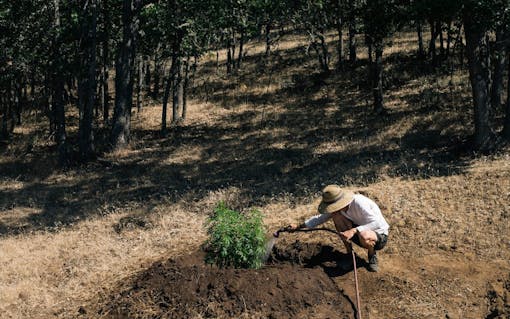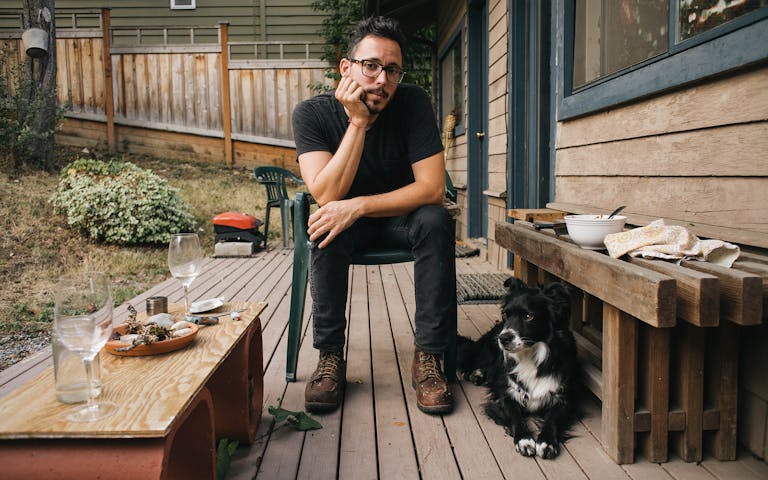On a Thursday evening, five Leafly staffers sat in a brightly lit art studio in the underbelly of Seattle’s industrial district. Outside, trains whistled by, but inside the studio we were zoned in, concentrating on the task at hand: making art.
Freshly stoned but by all means present, we took half an hour to decorate mandala circles using oil pastels, markers, and colored pencils while soft electronic music hummed in the background. No one spoke, except for the occasional whispered request for different tools and materials.
With cannabis, “the burden of perfectionism was out the window.”
We then tacked the finished mandalas to the wall next to the circles we’d completed during a sober session and assessed the differences. Someone mentioned feeling less inhibited and more relaxed after cannabis. With cannabis, said another, “the burden of perfectionism was out the window.”
Untroubled by our technical mistakes, we discussed surrendering expectations in exchange for the free-flow of feelings and ideas. Comparing our before-cannabis and after-cannabis mandalas, you could see hard lines begin to soften and blur. Rigid patterns collapsed into liberated free-form. The mandalas appeared as a mirror of the mind, a literal illustration of what was happening in each of our heads after cannabis dismantled this dam of perfectionism.
This session was facilitated by Michael Buchert, a licensed art therapist and mental health counselor, and graduate professor at Antioch University Seattle. He’s also a cannabis cultivator with a knack for infused baking, so if anyone can speak extensively about the intersection of cannabis and art therapy, it’s Buchert.
• • •

Not exactly, he said. What’s missing, he told me, is the relationship, or the two-way communication between patient and therapist.
“Art therapy is about how we can use the art to liberate our clients both in terms of their relationship with themselves—and also their relationship with others.”
“Art therapy is a mental health profession that mandates the facilitator is a trained professional often in a Master’s level program, because they are integrating psychology and diagnosis and theory in a way that allows them to use those things in the context of a relationship,” Buchert explained.
As a clinical practice, art therapy requires both art and therapist. A coloring book sold at Costco as “art therapy,” for example, isn’t therapy in the same sense. But if that same coloring book were used under the guidance of a trained professional with whom you’re developing a therapeutic relationship, that’s art therapy.
Shop highly rated dispensaries near you
Showing you dispensaries near“Art therapy is about how we can use the art to liberate our clients both in terms of their relationship with themselves, and also their relationship with others,” Buchert said. “And the ‘other’ in the art therapy relationship is the therapist.”

Plants being watered at Ritual Cannabis. (Andrew Snyder for Leafly)
There are different types of art therapy—contrasting approaches that use art, conversation, and analysis in disparate ways. Psychodynamic art therapy, for example, is a practice in which a facilitator asks questions about what’s happening in the art itself as it relates to the patient and their aspirations. Then there’s the art as therapy approach, which focuses on the inherently therapeutic aspects of art-making. In this dynamic, the facilitator asks the patient questions about process, intentions, and emotions related to the art itself.
If we accept that cannabis has the capacity to encourage self-expression and introspection, why might a therapist hesitate to fold cannabis into their practice?
• • •

“The industry of art therapy is rooted in Western, Euro-centric psychology—and cannabis is not that. It’s clear that these two worlds are struggling to integrate.”
He and his business partner, Zooey Zachow, now grow cannabis sustainably in rural Klickitat County, Washington. Zachow is an Iraq War veteran whose appreciation for cannabis bloomed after discovering its profound healing potential for those suffering with PTSD. Their farm, dubbed Ritual Cannabis, aims to root and raise cannabis by principles of compassion and connection.
“We started waking up to the realities that are our hearts, our minds, our bodies, our traumas,” he said, recollecting on the profound effect cannabis had on his own personal journey. “We started waking up as compassionate people.”

(Andrew Snyder for Leafly)
Even with that knowledge, it’s still not possible for Buchert to integrate cannabis into his professional practice. Licensed therapists in Washington are not allowed to use cannabis in a clinical setting. In fact, a therapist might not be able to work with a patient at all if they were perceived to be under the influence of cannabis.
“I’m board certified, which means there are ethical parameters within which I must work or I could lose my license,” Buchert explained. “Washington is the holder of my counseling license, but the ethics were written within federal guidelines.” Included in those ethical regulations is a prohibition against practicing art therapy with someone the therapist knows is intoxicated.

(Andrew Snyder for Leafly)
Buchert points out that these clinical definitions of “intoxication” are somewhat vague. Being visibly drunk, stoned, or high is one thing. But what if a patient took a prescription medicine—an opioid, Adderall, or even medical cannabis—with effects that weren’t readily apparent to the therapist?
“Where does cannabis fit into all that, especially knowing that cannabis—while it does have some dissociative properties—can have the capacity to tap us in even deeper than before?” Buchert said. “The industry of art therapy has no way to deal with that because it’s rooted in Western, Euro-centric psychology—and cannabis is not that. It’s clear that these two worlds are struggling to integrate.”

(Andrew Snyder for Leafly)
For now, licensed therapists are unable to allow cannabis to play an explicit role in art or talk therapy. But there’s a simple action every cannabis consumer can take in pushing the process along, and that is helping to unravel the moralization of cannabis use by simply talking about it–with their therapists, their doctors, and their loved ones.
Whether cannabis has caused you to struggle or has helped you prevail in your journey to health and happiness, your truthful experience can help this community of healing professionals see cannabis for what it really is.
And what it is, for many, is a powerful tool to awaken curiosity, expression, and inner connection made manifest by art.
Images by Andrew Snyder

(Andrew Snyder for Leafly)






